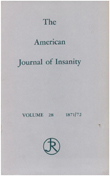Retreatment for relapse following desipramine discontinuation in dysthymia
Abstract
OBJECTIVE: It is an accepted yet unproven belief that prior favorable response to an antidepressant medication predicts good response to the same antidepressant during a subsequent depressive episode. The authors studied desipramine retreatment for dysthymic patients who had responded to desipramine during acute and continuation treatment and then subsequently relapsed after discontinuation of desipramine. METHOD: The subjects were 12 patients who had pure dysthymia or dysthymia with major depression who relapsed while taking placebo during maintenance treatment. Each patient received open desipramine treatment at a dose equal to or greater than that received during the continuation phase. RESULTS: Eleven (91.7%) of the 12 relapsed patients achieved full remission after an average of 4.7 weeks (range = 2-8 weeks, median = 4 weeks) of desipramine retreatment, a significant response rate. CONCLUSIONS: Positive response to desipramine strongly predicts favorable response to retreatment for depressive relapse following desipramine discontinuation.
Access content
To read the fulltext, please use one of the options below to sign in or purchase access.- Personal login
- Institutional Login
- Sign in via OpenAthens
- Register for access
-
Please login/register if you wish to pair your device and check access availability.
Not a subscriber?
PsychiatryOnline subscription options offer access to the DSM-5 library, books, journals, CME, and patient resources. This all-in-one virtual library provides psychiatrists and mental health professionals with key resources for diagnosis, treatment, research, and professional development.
Need more help? PsychiatryOnline Customer Service may be reached by emailing [email protected] or by calling 800-368-5777 (in the U.S.) or 703-907-7322 (outside the U.S.).



